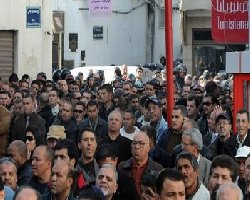At least four people have been killed in clashes with police in a provincial town in Tunisia, witnesses have said.
Six other protestors were seriously wounded.
The clashes are said to have taken place late on Saturday in Tala, about 200km southwest of the Tunisian capital Tunis, and near the border with Algeria.
Belgacem Sayhi, a teacher and trade union activist, told the AFP news agency that the victims were between 17 and 30 years old, and were killed when the police opened fire on the crowd. Two other people, who did not wish to be identified, corroborated the account.
An employee at a hospital in Tala told Reuters news agency that several people had been admitted to the hospital after the clashes, and other witnesses said that the six people who were in critical condition have been moved to the regional capital, Kasrine.
Citing a source at the hospital in Tala, the Reuters news agency reported that one person is confirmed to have been killed.
Witnesses said police fired their weapons after using water cannons to try to disperse a crowd which had set fire to a government building. The crowd has also thrown stones and petrol bombs at police.
Separately, witnesses in the nearby town of Gassrine, the provincial centre, told Reuters by telephone there were violent clashes there as well and that a number of people had been hurt.
There had already been unrest in Tala on Friday, with protesters attacking a bank and official buildings, and setting them on fire, Sadok Mahmoudi, a union leader, told AFP news agency.
The authorities in Tunisia refused to confirm either the deaths or details of the clashes.
Troop deployment
On Saturday, troops were deployed to the area for the first time since the start of the recent wave of unrest which has been in protest at high levels of youth unemployment.
The soldiers were assigned to protect public buildings, said Mahmoudi.
Protests sparked by high youth unemployment have spread from the central town of Sidi Bouzid to other parts chiefly in the north African country's interior, which lags behind the more prosperous coastal areas.
On Saturday, the Tunisian General Union of Labor (UGTT), the country's main union, condemned the authorities for their heavy-handed response to protestors.
Several hundred UGTT members gathered in the capital of Tunis to observe a minute's silence for those who have died since protests began.
"We support the demands of the people in Sidi Bouzid and interior regions," said Abid Brigui, deputy general secretary of the union, which is considered to be close to the government.
Last week, a 26-year-old Tunisian man who set off a wave of protests after attempting to commit suicide by setting himself on fire last month died of third-degree burns in hospital.
Zine al Abidine Ben Ali, the Tunisian president, has said the violent protests are unacceptable and could harm the country's interests by discouraging investors and tourists who provide a large part of the country's revenues.
Protests traditionally have been rare in Tunisia, which has had only two presidents since independence from France 55 years ago.
The country has in the past been praised by Western allies as a model of stability and prosperity in the Arab world.
PHOTO CAPTION
People are seen during a demonstration in Tunis, Tunisia, against high prices and unemployment, Saturday Jan.8, 2011.
Al-Jazeera


 Home
Home Discover Islam
Discover Islam Quran Recitations
Quran Recitations Lectures
Lectures
 Fatwa
Fatwa Articles
Articles Fiqh
Fiqh E-Books
E-Books Boys & Girls
Boys & Girls  Ramadan
Ramadan Fatwa Audios
Fatwa Audios Month of Mercy
Month of Mercy Women
Women Eed Al- Fitr
Eed Al- Fitr Food Recipes
Food Recipes Videos
Videos

 Prayer Times
Prayer Times












